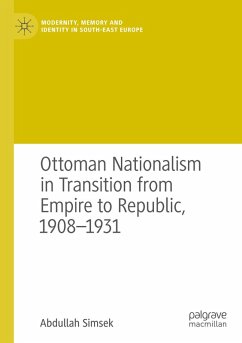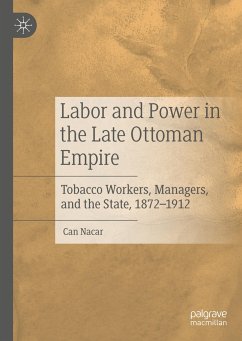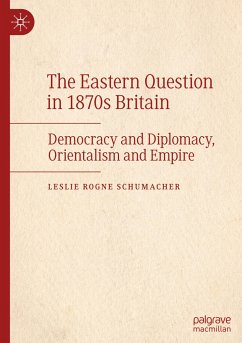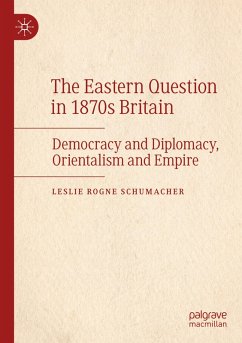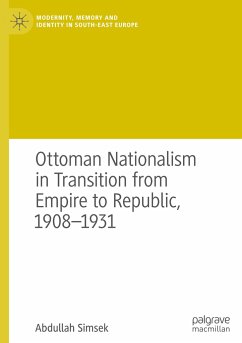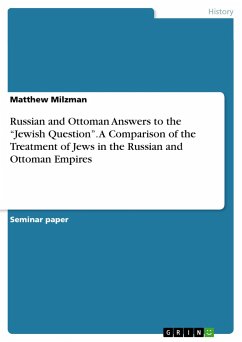
Russian and Ottoman Answers to the "Jewish Question". A Comparison of the Treatment of Jews in the Russian and Ottoman Empires
Versandkostenfrei!
Versandfertig in 1-2 Wochen
17,95 €
inkl. MwSt.

PAYBACK Punkte
0 °P sammeln!
Seminar paper from the year 2013 in the subject History - World History - Basics, grade: 94.0, Georgetown University, course: Tsars & Sultans, language: English, abstract: Both the Ottoman and Russian Empires had to contend with large, multiethnic, multi-religious populations. But, in these two empires, which relied on their identities as the vanguards of Sunni Islam and Orthodox Christianity, respectively, for both internal and external legitimacy, what were they to do with the vast amount of religious minorities who fell under their rule? Could they incorporate these religious minorities int...
Seminar paper from the year 2013 in the subject History - World History - Basics, grade: 94.0, Georgetown University, course: Tsars & Sultans, language: English, abstract: Both the Ottoman and Russian Empires had to contend with large, multiethnic, multi-religious populations. But, in these two empires, which relied on their identities as the vanguards of Sunni Islam and Orthodox Christianity, respectively, for both internal and external legitimacy, what were they to do with the vast amount of religious minorities who fell under their rule? Could they incorporate these religious minorities into society without either jeopardizing their religiously based legitimacy or fermenting dissent among them through alienation? Could these empires even trust these religious minorities, these heretics? These questions were at the very heart of both Russian and Ottoman policy towards, treatment, and perception of religious minorities during the period in which these two dynasties reigned. However, in both empires, a unique case presented itself. This group had no ties to any specific nation and had not had a homeland since antiquity. They were spread throughout both empires, not really residing predominantly in any one location, at least not to an extent where they became the majority. They were seemingly harmless, yet had such a negative reputation that hatred for them among other groups was commonly passed down through generations and was deeply ingrained. They spoke their own language, identified with each other ethnically as well as religiously, had their own set of customs, isolated themselves from others not of their group, and largely resisted assimilation. In short, this group was the quintessential "other." The group I am referring to is the Jews. In this paper, I will examine the status of the Jews and government policies towards them. I will then assess the facts, comparing and contrasting the conditions the Jews faced in these two empires. According to my own findings based in both primary and secondary sources, I have come to the conclusion that Jews under Ottoman rule experienced a higher level of basic treatment and enjoyed considerably more freedom and equality than their Russian counterparts did, and it is my aim in this paper to demonstrate exactly that. Entire books could and have been written on this very topic, detailing events stretching from the beginning of these empires to their ultimate collapse. For the purposes of this paper, I have narrowed my focus to the events of the nineteenth and early twentieth centuries, ending right on the cusp of the First World War.






